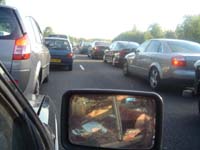Europe suffering from bad roads
The highway headaches are rooted largely in European governments' inability to craft a sensibly numbered, well-maintained and uniformly sign-posted highway grid.

He said public investment in transport infrastructure in the EU fell from 1.5 percent of gross domestic product in the 1980s to less than 1 percent in 2004.
That's a funding drop of Ђ 95 billion over 25 years, an amount that pales compared to the Ђ 346 billion EU governments pocketed in tax revenues from road users in 2004 alone, the AP reports.
That year, Cyprus, Malta and eight East European nations joined the EU, compounding the problem of bad highways: the 10 nations require 14,000 kilometers (8,700 miles) of new or upgraded highways - the equivalent of Germany's autobahn network.
The EU road federation says governments have paid scant attention to improving Europe's highways, even as car ownership has doubled and fuel costs have skyrocketed in the last 25 years.
Traffic in England, for instance, is expected to rise by as much as 10 percent by 2010, said a recent study of Britain's Institute for Public Policy Research. Seven out of 10 Britons think roadway congestion has worsened since 2003.
Subscribe to Pravda.Ru Telegram channel, Facebook, RSS!





